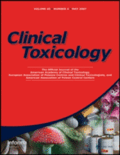
CLINICAL TOXICOLOGY
Scope & Guideline
Empowering Clinicians with Cutting-edge Insights
Introduction
Aims and Scopes
- Clinical Management of Poisoning Cases:
The journal focuses on the clinical management of various poisoning cases, including drug overdoses, chemical exposures, and envenomations, providing insights into treatment protocols and outcomes. - Epidemiological Studies:
Research published often includes epidemiological studies that analyze trends, risk factors, and outcomes associated with toxic exposures, offering valuable data for public health initiatives. - Development of Antidotes and Treatments:
The journal features studies on the efficacy and safety of new and existing antidotes, treatment modalities, and therapeutic interventions for poisonings. - Toxicological Case Reports:
Clinical case reports that detail unusual or severe toxicological incidents, providing learning opportunities for healthcare providers. - Public Health Implications:
Research often addresses the broader public health implications of toxic exposures, including prevention strategies and the impact of regulations on poisoning incidents. - Innovative Diagnostic and Management Approaches:
The journal explores novel diagnostic tools and management strategies for toxicological emergencies, including the use of technology and remote consultations.
Trending and Emerging
- Impact of Novel Psychoactive Substances (NPS):
Research into the effects, prevalence, and management of novel psychoactive substances has significantly increased, reflecting the growing concern over their use and associated toxicities. - Opioid Crisis and Related Toxicities:
Given the ongoing opioid epidemic, there is a marked increase in studies examining opioid-related poisonings, including the role of synthetic opioids and their management in emergency settings. - Cannabis and Derivatives:
With the legalization of cannabis in various regions, research has expanded to include cannabis-related toxicities, particularly in pediatric populations and the implications of recreational use. - Telemedicine and Remote Consultations:
The use of telemedicine for poison management and consultations has gained traction, especially during the COVID-19 pandemic, leading to innovative approaches in clinical toxicology. - Environmental and Chemical Disaster Response:
Research focusing on the clinical response to chemical disasters and environmental exposures has become more prominent, especially in the context of public health emergencies. - Technological Integration in Toxicology:
There is a growing trend towards integrating technology, such as artificial intelligence and machine learning, into toxicology research for improved diagnostics and decision-making.
Declining or Waning
- Traditional Antivenom Use:
There has been a noticeable decline in research focused solely on traditional antivenom use as newer therapies and combination treatments gain prominence in managing snakebites and envenomations. - Over-the-Counter Medication Poisoning:
Research on over-the-counter medications has decreased as the focus shifts towards more complex cases involving prescription drugs and novel psychoactive substances. - Chemical Exposure from Household Products:
The frequency of studies specifically targeting household product poisonings has waned, possibly due to increased public awareness and regulatory changes reducing such incidents. - Acute Alcohol Poisoning in Adults:
Although still prevalent, the amount of research specifically dedicated to acute alcohol poisoning in adults has decreased as the focus moves towards poly-drug use and its implications. - Long-term Effects of Certain Drugs:
Studies examining the long-term effects of specific drugs, especially older medications, have become less common, with emerging drugs and newer therapeutic agents taking precedence.
Similar Journals
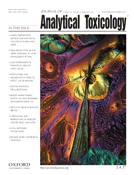
JOURNAL OF ANALYTICAL TOXICOLOGY
Exploring the Depths of Toxicological ScienceJOURNAL OF ANALYTICAL TOXICOLOGY, published by Oxford University Press Inc, stands as a leading platform in the field of analytical chemistry and toxicology, focusing on the rigorous exploration of methodologies and advancements in the detection of toxic substances. Since its inception in 1977, this journal has continually contributed to the scientific community, providing researchers and professionals with vital insights into chemical health, safety, and environmental implications. With an impressive Q1 ranking in both Analytical Chemistry and Chemical Health and Safety, along with reputable Q2 rankings in Environmental Chemistry and Toxicology, the journal maintains its critical standing in vibrant academic communities, ensuring the dissemination of high-quality research. Although it currently does not offer open access, articles are made available via institutional subscriptions, allowing widespread access to its valuable findings. Located in the United States, the journal contains a wealth of knowledge poised to benefit scientists and scholars engaged in toxicological research, emphasizing its importance in enhancing public health and safety.
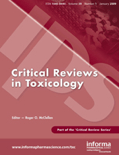
CRITICAL REVIEWS IN TOXICOLOGY
Elevating Understanding of Chemical Risks and ImpactsCRITICAL REVIEWS IN TOXICOLOGY, published by Taylor & Francis Ltd, stands as a preeminent journal within the field of toxicology, boasting an impressive Q1 ranking and holding the distinction of being ranked 12th out of 133 in the toxicology category according to Scopus, placing it in the top 91st percentile. With a continuous publication history since 1971 and a commitment to providing high-quality reviews, the journal offers critical insight into the latest research and advancements in toxicological sciences. While it is not an open-access journal, it provides numerous access options for both subscribers and institutions, ensuring that its extensive articles are widely available to the academic community. The journal's objectives are to disseminate comprehensive reviews that foster understanding and innovation in the assessment of chemical risks, environmental impacts, and the mechanisms of toxicity, making it an invaluable resource for researchers, professionals, and students dedicated to the science of toxicology.
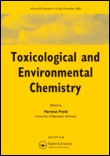
TOXICOLOGICAL AND ENVIRONMENTAL CHEMISTRY
Unraveling the complexities of chemicals and their environmental effects.TOXICOLOGICAL AND ENVIRONMENTAL CHEMISTRY is a pivotal journal published by Taylor & Francis Ltd, addressing critical intersections between environmental chemistry and toxicology since its inception in 1979. With its ISSN 0277-2248 and E-ISSN 1029-0486, the journal serves as a platform for rigorous research and innovative methodologies in pollution control, health implications of environmental chemicals, and the broader spectrum of toxicological studies. Although it currently does not offer open access, the journal's impact in the field is underscored by its Category Quartiles rankings in 2023, placing it in Q3 across Environmental Chemistry, Health, Toxicology and Mutagenesis, and Pollution categories. Furthermore, its Scopus rankings reveal its significant role within the scientific community, specifically in areas such as Environmental Science and Toxicology. The journal aspires to foster multidisciplinary dialogue and advance knowledge that contributes to environmental sustainability and public health, making it an essential resource for researchers, professionals, and students dedicated to these fields.
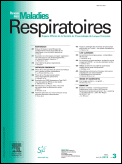
REVUE DES MALADIES RESPIRATOIRES
Illuminating the path to respiratory health advancements.REVUE DES MALADIES RESPIRATOIRES is a distinguished journal published by MASSON EDITEUR, focusing on the vital field of pulmonary and respiratory medicine. Established in 1984, this journal has become a prominent platform for sharing innovative research and clinical findings, reflecting an impressive array of studies that contribute to our understanding of respiratory diseases. With its ISSN 0761-8425 and E-ISSN 1776-2588, it facilitates access to scholarly work within the medical community, although it currently operates under a subscription model rather than Open Access. As indicated by its quartile ranking of Q4 in 2023 within its category and a Scopus rank of #128/155, REVUE DES MALADIES RESPIRATOIRES serves as an essential resource for researchers, professionals, and students aiming to stay informed about advancements in respiratory health. This journal plays a crucial role in fostering discussions that drive innovation and best practices in the treatment and understanding of respiratory conditions.

Toxicology Research
Fostering interdisciplinary collaboration for a healthier world.Toxicology Research is a distinguished journal dedicated to advancing the field of toxicology through the dissemination of high-quality research. Published by Oxford University Press, this UK-based journal focuses on critical aspects of toxicology and mutagenesis, highlighting both environmental and pharmacological implications. With an ISSN of 2045-452X and an E-ISSN of 2045-4538, it serves as a valuable resource for researchers, professionals, and students alike. Currently categorized in the Q3 quartile for Health, Toxicology and Mutagenesis, as well as Toxicology in 2023, Toxicology Research maintains a visible presence in Scopus rankings, positioning itself within the targeted professional community. Although the journal operates without open access options, its importance in contributing to scientific discussions and policy formation is undeniable. Covering content from 2012 to 2024, it continues to provide insights into contemporary toxicological challenges, thereby fostering interdisciplinary collaborations and informing best practices in health and safety.

Journal of Medical Toxicology
Advancing the Frontiers of Toxicology in MedicineThe Journal of Medical Toxicology, published by SPRINGER, is a leading interdisciplinary journal dedicated to advancing the understanding of toxicology and its implications in medical practice. With an ISSN of 1556-9039 and an E-ISSN of 1937-6995, this esteemed journal has been a pivotal resource since its inception in 2005, continuing to serve the scientific community through its convergence period lasting until 2024. Its prestigious positioning in the Q2 category in both Health, Toxicology and Mutagenesis, and Toxicology reflects its significant contribution and reputation within the field, recognized by impressive Scopus rankings in Environmental Science and Pharmacology. This journal delves into critical issues surrounding the diagnosis and treatment of toxic exposures, thereby aligning closely with both clinical and public health objectives. Researchers, professionals, and students can benefit from the robust analyses and innovative findings published within its pages, reinforcing the journal's role as an essential platform for knowledge dissemination in medical toxicology.
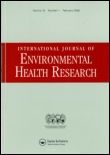
INTERNATIONAL JOURNAL OF ENVIRONMENTAL HEALTH RESEARCH
Bridging Disciplines for Sustainable SolutionsINTERNATIONAL JOURNAL OF ENVIRONMENTAL HEALTH RESEARCH, published by Taylor & Francis Ltd, serves as a cornerstone for interdisciplinary research focusing on the crucial intersections of environmental science and public health since its inception in 1991. With an ISSN of 0960-3123 and an E-ISSN of 1369-1619, the journal spans diverse topics related to environmental health, toxicology, and pollution science, holding high ranks in 2023 such as Q2 in Pollution and Public Health, showcasing its vital contributions to the field. Researchers will appreciate its robust platform as it features rigorous peer-reviewed articles aimed at unveiling the complexities of human health in relation to environmental factors. While the journal maintains a traditional access model, it ensures broad dissemination of high-quality research works. As a reputable source for both emerging and established scholars, the International Journal of Environmental Health Research offers critical insights and advancements pivotal to fostering a healthier planet.
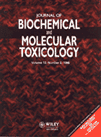
JOURNAL OF BIOCHEMICAL AND MOLECULAR TOXICOLOGY
Unraveling the Complexities of Molecular ToxicologyJournal of Biochemical and Molecular Toxicology, published by Wiley, plays a pivotal role in the advancement of knowledge within the fields of biochemistry, toxicology, and molecular biology. Established in 1998, this esteemed journal has garnered a significant reputation, evidenced by its current placement in the Q2 quartile across several categories, including Biochemistry, Health, Toxicology and Mutagenesis, and Medicine. With an ISSN of 1095-6670 and an E-ISSN of 1099-0461, it serves an international audience, offering critical insights and innovative research that shape our understanding of biochemical interactions and toxicological assessments. While it does not operate on an open-access model, the journal ensures rigorous peer review and high-quality publication standards, making it a valuable resource for researchers, professionals, and students dedicated to the exploration of molecular toxicology. The journal's recognized impact within the scientific community is reflected in its competitive rankings among specialized journals, fostering significant contributions to both academic and applied contexts.
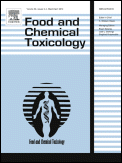
FOOD AND CHEMICAL TOXICOLOGY
Exploring the critical links between food safety and public health.FOOD AND CHEMICAL TOXICOLOGY, published by Pergamon-Elsevier Science Ltd, is a prestigious journal with a significant impact in the fields of food science, medicine, and toxicology, reflecting its Q1 and Q2 quartile rankings in various categories as of 2023. Established in 1982, this journal continues to serve as an essential platform for disseminating high-quality research focused on the toxicological assessment of foods and chemicals, aiming to advance knowledge that affects public health and safety. With a pivotal role in integrating diverse disciplines, including pharmacology and agricultural sciences, the journal ranks impressively within the top percentiles—specifically 95th in Toxicology and 92nd in Food Science on the Scopus metrics. Though it operates on a traditional subscription model, the journal is committed to providing valuable insights and findings to researchers, professionals, and students across the globe, making it a vital resource in the ongoing discourse around food safety and environmental health. Its comprehensive scope underscores its importance in shaping evidence-based policies and practices.

Toxicology and Environmental Health Sciences
Navigating the Complexities of Toxicology and HealthToxicology and Environmental Health Sciences is a peer-reviewed journal published by the Korean Society for Environmental Risk Assessment & Health Science, dedicated to advancing the fields of toxicology and environmental health. With an ISSN of 2005-9752 and E-ISSN 2233-7784, this journal serves as a vital platform for researchers, professionals, and students seeking to explore the intricate relationships between environmental risks and public health. Operating from South Korea, it has a converged years span from 2009 to 2024, and currently holds a respectable Q3 quartile ranking in both Health, Toxicology and Mutagenesis and Toxicology. This positions the journal within a critical space for those invested in understanding and mitigating environmental health challenges. Although not an open-access journal, it continues to foster high-impact research, contributing to a better understanding of toxicological sciences and environmental health dynamics. Engage with the latest findings and discussions that shape this evolving field through the insightful articles published herein, reinforcing its importance as a resource for scholars and practitioners alike.